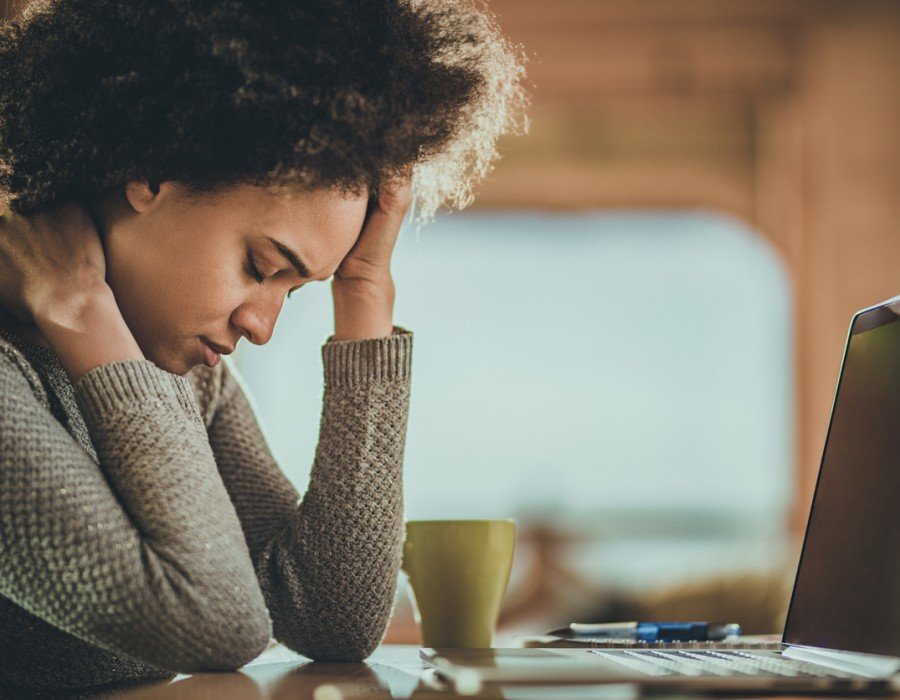Health and Wellbeing
Why do I have pain at the base of my skull?

Ever wonder why you get pain at the base of your skull?
It can be very concerning, even more so if it spreads. We asked out expert team of Bodyset physiotherapists to share their advice on the possible causes, and ways to relieve the pain.
Tension headaches
So you’ve Googled ‘Pain at the base of my skull’ and you’re wondering what’s causing it… In a nutshell, the cause of the pain is usually down to a tension headache.
Tension headaches are caused as a result of muscle tension and trigger points which build up in the surrounding muscles of the neck and head. All the muscles which control the movement of the neck are very small. They are all accountable for very subtle movements of the upper cervical spine and skull. These muscles can come under tension for various reasons such as:
- Eyestrain
- Adopting a slouching posture
- Stress
- Trauma
However, stress is the most common cause of tension headaches.
What is the pain like?
This pain is known to be described as a dull heaviness, which starts at the base of the head, and spreads round like a band across the eyes. It can also move through your neck, to the back of your shoulders, and to the fibres of your upper trapezius. As such, these muscles may be very tender to touch or stretch.
Different types of headaches
There are two types of tension headaches; episodic and chronic. Episodic headaches can last from 30 minutes, right up to a week. These are infrequent and will occur less than 15 days within a monthly period. On the other hand, a chronic tension headache can occur for more than 15 days in a month and last over 3 months. If the pattern of your headache changes, frequency increases to more than twice a week, or you are concerned that the headache has become chronic, then you should seek medical advice from your physiotherapist or GP.
Why do I have pain at the base of my skull?
Occipital Neuralgia is a specific type of pain which can occur in the base of your skull. This pain is easily confused with tension headaches. However, there are a few differences between the two. Occipital Neuralgia is characterised by piercing, throbbing or electric shock like pains in the upper neck, base of skull and back of the ears. The skull may also be sensitive to touch, and looking into light will be uncomfortable.
Causes of these symptoms include irritation or injury to the greater and lesser occipital nerves. This can be acute, from a trauma, or a gradual onset due to tightening of the muscles surrounding the neck and compressing the nerves. The positives being, it’s not life-threatening and can be easily treated with heat, rest, anti-inflammatories, and physiotherapy treatment plan.
How to eliminate your tension headache
Ensure you are up to date with you eye examinations.
Whether that is having your first eye examination or booking in for a review if it has been over two years since you’ve last been for one.
Check your workstation!
You should not be slouching into your chair or leaning forward to reach the screen. Your feet should be flat on the ground with a 90-degree angle from your hips to your knees. You should aim to rest your elbows on the armrests or table and aim to keep your back straight and supported. If in doubt, ask for a desk assessment from your employer.
Keep your neck and head as mobile as possible
Try and take regular breaks as this encourages you to naturally move your head and spine. This also prevents muscles from tightening up.
Introduce yoga or meditation
These activities can help rid any tension headaches which may be caused by stressed.
In addition to this, adopt a lifestyle which is beneficial to your health. This includes getting enough sleep, not smoking, regular exercise, maintaining a healthy and balanced diet. Finally, remember to drink plenty of water and limit your alcohol, caffeine, and sugar intake.
Reach out for help
If you’re experiencing a niggling pain that won’t go away, then book in to see one of our expert Bodyset physiotherapists. We’re here to help you get the best out of your body so you can get back to doing more of what you love.
Our 25+ clinics are conveniently located in towns and city centres around the country, and we’re open for early morning, lunchtime, and evening appointments to suit your schedule.